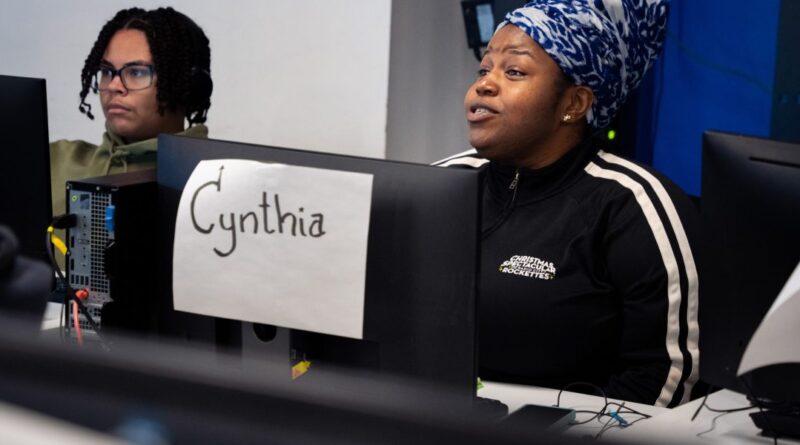‘If there’s no bottom rung on the ladder, it’s really hard to jump up’: Nonprofits targeting Gen Z employment receive $25M windfall Citi Foundation | Luck
Faced with a rapidly changing job market, young job seekers are having a tough time.
The unemployment rate for 22- to 27-year-olds in the US is at a ten-year high outside of the pandemic. Companies are reluctant to add employees amid such economic uncertainty. The hiring slump is particularly affecting professions such as information technology, which employ more college graduates, creating job-hunting nightmares for fewer and fewer college graduates. Not to mention fears that AI will replace entry-level roles.
So the Citi Foundation has identified youth employability as the theme for this year’s $25 million Global Innovation Challenge. The banking group’s philanthropic arm is donating half a million dollars to each of 50 groups around the world that provide digital literacy skills, technical training and career guidance to low-income youth.
“We want to make sure young people are as prepared as possible to find employment in a world that’s evolving really fast,” said Ed Skyler, director of Citi Enterprise Services and Public Affairs.
Feedback from employers to the Citi Foundation indicated that early-career candidates lacked the technical skills necessary for the roles many had been preparing to fill, highlighting the need for further professional training and the importance of soft skills.
Skyler pointed to a recent World Economic Forum survey of more than 1,000 companies that together employ millions of people. Skills shortages have been identified as the biggest obstacle to business transformation over the next five years. Two-thirds of respondents said they planned to hire people with specific AI skills, and 40% expected to eliminate tasks that AI could complete.
Some grants are responding by teaching people how to get AI chatbots to do jobs that can be automated. But Skyler emphasized that it’s just as important that they fund efforts to impart qualities that AI lacks, such as teamwork, empathy, judgment and communication.
“This is not a one-size-fits-all effort where we think every young person needs to be able to code or interact with AI,” Skyler said. “What is consistent across the programs is that we want to develop soft skills.”
Among the recipients is NPower, a national nonprofit that works to improve economic opportunity in underinvested communities by making digital careers accessible. Most of their students are young adults between the ages of 18 and 26.
NPower Chief Innovation Officer Robert Vaughn said the Citi Foundation grant will at least double the spaces available in the program for “green students” without a technical background and often without a college degree.
With the tech industry’s ever-changing skill and certification requirements, he said, applicants must demonstrate broad capabilities in both cloud computing and artificial intelligence, project management and emotional intelligence.
As some entry-level roles are being automated and outsourced, Vaughn said companies aren’t necessarily looking for college degrees and specialized skill sets, but AI comfort and general ability.
“Now it’s more about being more than an isolated, siled technical person,” he said. “You have to actually be a customer service person.”
Per Scholas, a non-profit organization focused on free technology training, is another recipient of a grant announced Tuesday. Its president, Caitlyn Brazil, said the funds will help advance the careers of about 600 young adults in Los Angeles, New York, Orlando, Chicago and the greater Washington, DC area.
To keep their classes relevant, they spend a lot of time strategizing with small and large businesses. The Citi Foundation’s focus on youth employability is particularly important, she says, because she often hears that the rise of AI productivity has forced companies to rethink essential roles.
Dwindling early-career opportunities have forced workforce development nonprofits like hers to provide enough hands-on training to secure jobs that previously would have required much more experience.
“But if there’s no bottom rung on the ladder, it’s really hard to jump up, isn’t it?” Brazill said.
She warned that failing to create new career paths could damage the economy in the long term by preventing young people from pursuing high-growth careers.
Martha Ross, a senior fellow at the Brookings Institution, said the fund was certainly right to focus on technological disruption to the labor market. But she said the scale of the disruption required a response that was itself “too big for philanthropy.”
“We didn’t do very well with previous moves due to automation,” Ross said. “We left a lot of people behind. And now we have to decide if we’re going to do it again or not.”
___
Associated Press coverage of philanthropy and nonprofits gets support through AP’s collaboration with The Conversation US, with funding from the Lilly Endowment Inc. AP is solely responsible for this content. For all AP philanthropy information, visit https://apnews.com/hub/philanthropy.
